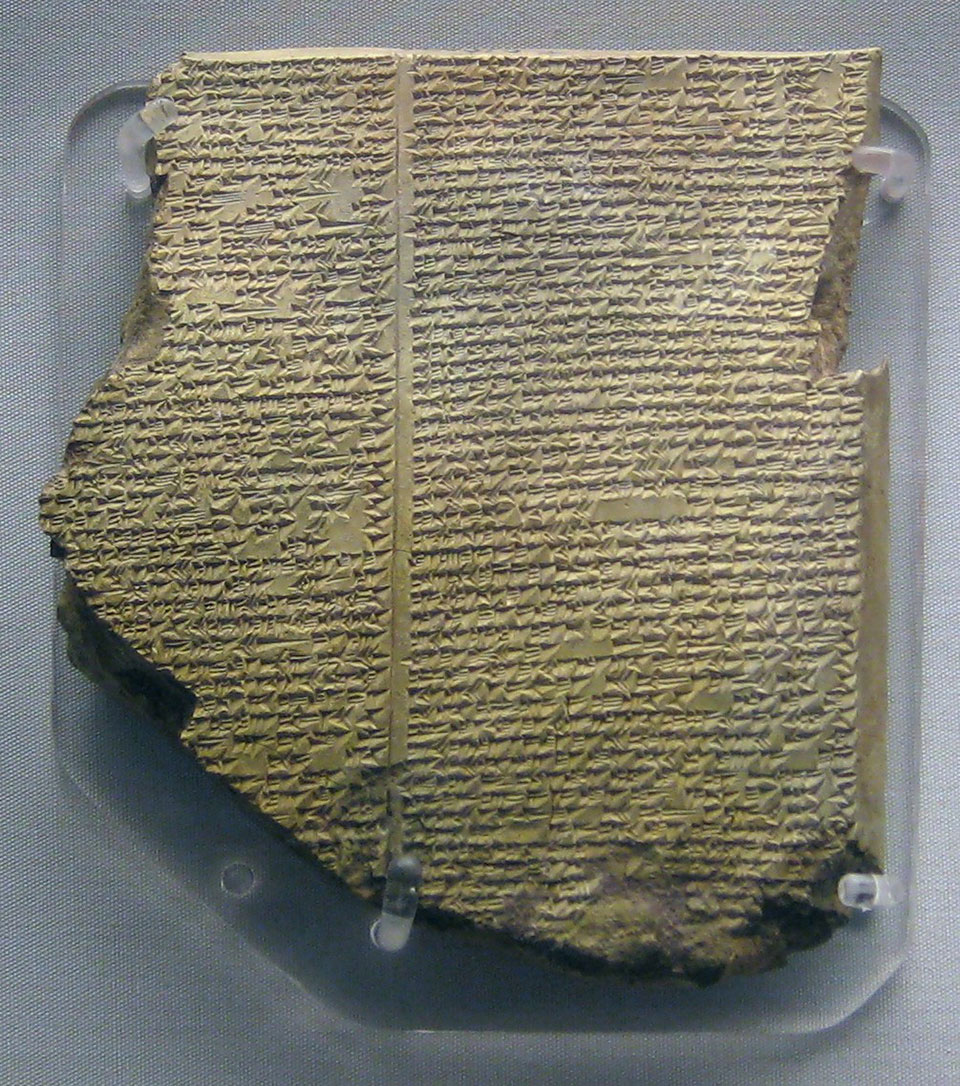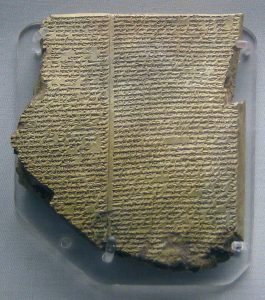The Epic of Gilgamesh is considered by scholars to be the first great piece of literature in human history. After being lost for millenia, it was reintroduced to the world in the 19th century with translations of various fragments discovered on cuneiform tablets during the early days of archaeological investigation of the ancient Middle East and Mediterranean basis. The the century or so since, the work has been retranslated numerous times as knowledge of the Babylonian language has improved and as additional passages are discovered on newly unearthed tablents. World Literature Today ran an interview with Assyriologist Benjamin Foster discussing some of the latest discoveries:
“Benjamin: Several important new pieces have been published since my translation appeared in 2001. An important new manuscript of the opening lines has turned up in Syria, first translated into English by Andrew George (2007a). This gives us the correct reading of the opening lines, for which myriad restorations had been proposed, most of them wrong, and adds, drops, and rearranges lines in interesting ways. Here is an excerpt (this and the following are my own translations):
“He who saw the wellspring, the foundations of the land,
Who knew the ways, was wise in all things,
Gilgamesh, who saw the wellspring, the foundations of the land,
Who knew the ways, was wise in all things,
He it was who looked on sacred places everywhere.
“This manuscript gives us new text for lines 29 to 38:
“Gilgamesh wrestled with fifty companions,
wearing out the young men every day,
He kept the young men of Uruk fearful in . . .
The locks of his hair grew thick as a grain field,
His teeth gleamed like the rising sun,
His hair was dark as purple wool.
Eleven cubits was his height,
Four cubits his chest, from nipple to nipple,
A triple cubit his feet and a rod his stride,
A triple cubit the beard of his cheek . . .
“These new lines do not change the story or our overall assessment of the poem but they do bring our vision of Gilgamesh himself into sharper focus.
“Another surprise has been a description of the marvelous Cedar Forest in Tablet V, part of a tablet containing nearly 140 lines of Tablet V in the Sulaymaniyah Museum and published by al-Rawi and George (2014).
“The cedar was dappled sixty cubits high with incrustation,
The resin [oozed] out, dribbling down like raindrops,
It [flowed into a torrent] and ditches carried it away.
Throughout the forest birdlife was chirping,
. . . answering each other in rhythmic din . . .
A pigeon was cooing, a turtledove answering,
The forest was joyous with the [cry] of the stork,
The forest was abundantly joyous from the [lilt] of the francolin.
Mother monkeys kept up their calls, baby monkeys squeaked . . .
Like a band of musicians and drummers,
They resounded all day long in the presence of Humbaba . . .
“A new and quite different description of the ark in yet another tablet was a headline-maker (Finkel 2014):
“I laid out thirty ribs within her, ten rods long, twenty fingers thick,
I fastened 3,600 stanchions within her, ten fingers thick, half a rod long,
I walled in her compartments, above and below.
I allowed one finger thick of bitumen for her outside,
I allowed one finger thick of bitumen for her inside,
I had poured out one finger thick of bitumen for her compartments,
I had my kilns loaded with 28,800 measures of liquid tar,
Then I poured out 3,600 measures of bitumen into her.
The bitumen did not come all the way up,
Five fingers thick of lard I added.
I had the kilns loaded . . . equally . . .
“In another newly found version of Gilgamesh’s dreams of Enkidu, Gilgamesh is mysteriously replaced by the moon-god, Sin, and Enkidu by the god of wisdom, Ea. This is presumably set in Ur, not Uruk (George 2007b). ‘
Read the entire piece here:


